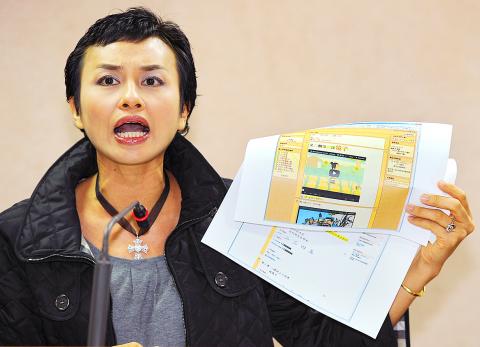Overseas Chinese Affairs Council (OCAC) Minister Wu Ying-yih (吳英毅) came under fire from the Democratic Progressive Party (DPP) again yesterday over the council’s promotion of simplified Chinese characters.
In September, DPP Legislator Hsiao Bi-khim (蕭美琴) said that the name of the agency had been changed without prior notice from “Overseas Compatriots Affairs Commission” — a reversal of a former DPP administration’s decision in 2006 that opted for the politically neutral “compatriots” so as to unite Taiwanese expatriates divided by issues of national identity.
At a Foreign Affairs and National Defense meeting in the legislature yesterday, which was scheduled to review the council’s budget statement for next year, DPP Legislator Chiu Yi-ying (邱議瑩) criticized the council for creating online resources to learn simplified Chinese characters.

Photo: Liao Chen-hui, Taipei Times
Over the past four years, the council spent an average of NT$6 million (US$207,000) each year on the Web site, E-learning Huayu in Taiwan, even though the learning resources available for download are in simplified Chinese, Chiu said.
“Could it be that the OCAC is working to help China promote simplified characters?” she asked.
Hsiao questioned whether Wu valued simplified Chinese characters more than traditional Chinese characters and Taiwanese culture.
“China sets up Confucius Institutes around the world to teach simplified Chinese characters. Don’t bother helping China promote simplified Chinese characters,” Hsiao said.
Wu said that the simplified Chinese characters available on the Web site were uploaded by Chinese-language teachers in the private sector and were not provided by the council.
“Actually we juxtapose learning resources in traditional and simplified characters on the Web site. The learning resources in simplified Chinese characters help people who know simplified Chinese characters to learn traditional Chinese characters,” Wu said.
Chinese Nationalist Party (KMT) Legislator Chan Kai-chen (詹凱臣) also found it “inappropriate” that a government-administered Web site provided Chinese-language learning resources in simplified characters, despite the “good intention.”
When pressed on the issue, Wu agreed to remove the characters.
Regarding the agency’s name change — a decision which has been decried by expatriates, Wu said that the council recognized the situation.
“We noticed that about 120 overseas compatriot communities have systematically voiced their opposition [to the name change]. But overall, the number of overseas compatriot communities that we have contact with amounts to 4,000 or 5,000,” he said.
Hsiao responded by saying: “You said 4,000 or 5,000? Many of the compatriots have never resided in Taiwan. They never pay taxes in Taiwan. They were not born in Taiwan.”
A total of NT$1.3 billion was earmarked for the council’s budget for next year.
Wu called on legislators not to cut the budget as he said that under the current budget for next year, the council could spend only NT$480 on each expatriate, if the population of expatriates includes all those people who have moved from Taiwan.
The council has a broader definition of the expatriate population — ethnic Chinese who live in an overseas country and identify with the Republic of China (ROC).
In related developments, Wu said he agreed to renaming the agency to ROC (Taiwan) Overseas Community Affairs Council after opposition legislators threatened to freeze its budget. Wu said he would ask the Executive Yuan to approve the change.

The Ministry of Economic Affairs has fined Taobao NT$1.2 million (US$36,912) for advertisements that exceed its approved business scope, requiring the Chinese e-commerce platform to make corrections in the first half of this year or its license may be revoked. Lawmakers have called for stricter enforcement of Chinese e-commerce platforms and measures to prevent China from laundering its goods through Taiwan in response to US President Donald Trump’s heavy tariffs on China. The Legislative Yuan’s Finance Committee met today to discuss policies to prevent China from dumping goods in Taiwan, inviting government agencies to report. Democratic Progressive Party Legislator Kuo Kuo-wen (郭國文) said

The Ministry of Economic Affairs has fined Taobao NT$1.2 million (US$36,900) for advertisements that exceeded its approved business scope and ordered the Chinese e-commerce platform to make corrections in the first half of this year or its license would be revoked. Lawmakers have called for stricter supervision of Chinese e-commerce platforms and more stringent measures to prevent China from laundering its goods through Taiwan as US President Donald Trump’s administration cracks down on origin laundering. The legislature’s Finance Committee yesterday met to discuss policies to prevent China from dumping goods in Taiwan, inviting government agencies to report on the matter. Democratic Progressive Party

Taiwan and its Pacific ally Tuvalu on Tuesday signed two accords aimed at facilitating bilateral cooperation on labor affairs, according to Taiwan’s Ministry of Foreign Affairs (MOFA). The governments inked two agreements in Taipei, witnessed by Foreign Minister Lin Chia-lung (林佳龍) and visiting Deputy Tuvaluan Prime Minister Panapasi Nelesone, MOFA said in a news release. According to MOFA, the agreements will facilitate cooperation on labor issues and allow the two sides to mutually recognize seafarers’ certificates and related training. Taiwan would also continue to collaborate with Tuvalu across various fields to promote economic prosperity as well as the well-being of their

Sung Chien-liang (宋建樑), who led efforts to recall Democratic Progressive Party (DPP) Legislator Lee Kun-cheng (李坤城), was released on bail of NT$80,000 today amid outcry over his decision to wear a Nazi armband to questioning the night before. Sung arrived at the New Taipei District Prosecutors’ Office for questioning in a recall petition forgery case last night wearing a red armband bearing a swastika, carrying a copy of Adolf Hitler’s Mein Kampf and giving a Nazi salute. Sung left the building at 1:15am without the armband and covering the book with his coat. Lee said today that this is a serious